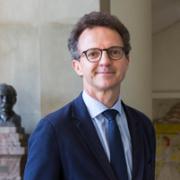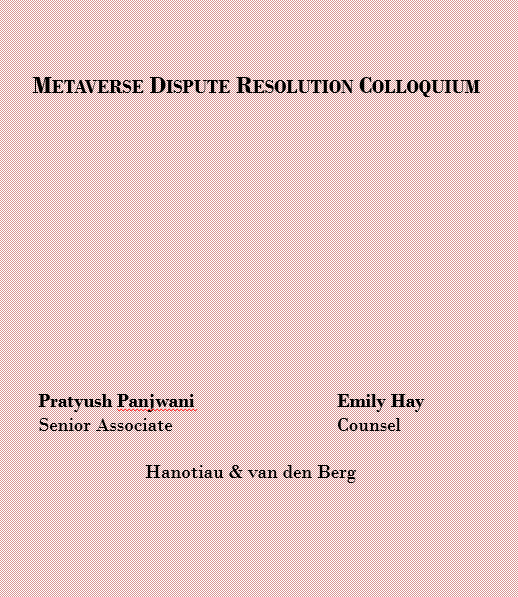About
The report on the Metaverse Dispute Resolution Colloquium is now available on Kluewer Arbitration blog : here
The Metaverse Dispute Resolution Colloquium is an online research-oriented forum organized by the Digital Law Center (University of Geneva), the Geneva Center for International Dispute Settlement (CIDS) and MetaverseLegal (a decentralized initiative dedicated to exploring the legal implications of the Metaverse) that brings together experienced arbitration practitioners from MetaverseLegal, and young scholars / international dispute resolution & international arbitration students with an interest in technology, web 3.0 and the metaverse, in order to explore selected legal issues arising from disputes in the metaverse and about the metaverse.
Our speakers will present and discuss research and policy questions at the intersection of the metaverse and of international dispute resolution and international arbitration.
The Colloquium aims to offer to young scholars, practitioners and students specialized in international dispute resolution & international arbitration the opportunity to actively participate and contribute to the discussion by their comments and reactions. The Colloquium further aims to create a global community of young legal scholars and practitioners working on metaverse dispute resolution issues.
In order to encourage interactive discussions at the Colloquium, the number of participants will be limited.
Useful informations
The report of the Metaverse Dispute Resolution Colloquium can be found : here
Program
2 pm Welcome address & Introduction
Prof. Jacques de Werra, Faculty of Law of the University of Geneva & Director of the Digital Law Center, member of the Committee of the Geneva Master in International Dispute Settlement (MIDS)
2.05 pm Topic 1: Applicable Law and Choice of Courts in Metaverse Disputes
Presentations by Laura Azaria and Juliette Asso, both Counsel, LALIVE
The speakers will address Private International Law issues that arise in case of disputes arising out of Metaverse-related transactions, and in particular issues of applicable law and choice of court. These are not easy questions in the current legal framework. There are neither private law rules adopted by one or several States in relation to the Metaverse, nor uniform rules of law at the international level. Yet the features of Metaverse transactions are such that traditional connecting factors may no longer be applicable. We will explore together the main questions that arise in this context:
- Where can a claim deriving from a Metaverse transaction be brought?
- Are choice of court clauses in Metaverse-related transactions common practice? Are they valid?
- Absent a valid choice of court clause, how to determine the competent court? What are the connecting factors related to a transaction performed via smart contract in a dematerialized and decentralized environment?
- Are choice of a law agreements in Metaverse-related transactions common practice? Are they valid?
- What are the fallback rules in the event that no valid choice of law is made?
2.25 pm Comments and Questions on Topic 1 by young scholars, practitioners and students specialized in international dispute resolution & international arbitration / Discussion with the participants
2.45 pm Topic 2: Enforcement Issues in Metaverse Disputes
Presentations by Emily Hay, Counsel, Hanotiau & van den Berg and Pratyush Panjwani, Senior Associate, Hanotiau & van den Berg
The speakers will address issues arising in relation to the enforcement of arbitral awards or of decisions resulting from processes resembling arbitration. In the Metaverse context, this will include dispute resolution via blockchain pursuant to arbitration agreements (or other dispute resolution clauses) embedded in smart contracts. The Metaverse raises novel issues for enforcement, inter alia due to the potential for automated enforcement of decisions, user expectations related to anonymity and efficiency, and the manner of conducting legal relations in a 3D virtual world. Questions that will be considered include:
- Whether the New York Convention applies to metaverse-related disputes (Art. I of the New York Convention);
- Challenges to the validity of arbitration agreements in the metaverse (Arts. II(3), V(1)(a) of the New York Convention);
- Whether the writing requirement in of the New York Convention can be satisfied in the metaverse (Art. II(2) of the New York Convention);
- Whether due process should be reimagined in the metaverse context (Art. V(1)(b)) of the New York Convention).
3.05 pm Comments and Questions on Topic 2 by young scholars, practitioners and students specialized in international dispute resolution & international arbitration / Discussion with the participants
3.30 Closing
People

Jacques de Werra
Founder/former director of the Digital Law Center
Professor at the Faculty of Law
Admissions and registration
Participation (which is free) in the Colloquium is designed to give priority to young scholars, practitioners and students specialized in international dispute resolution & international arbitration.
Applications for participation shall be sent by February 24, 2023 to digitallawcenter unige [point] ch and shall contain a short (max. 1 page) statement giving the applicant’s (i) affiliation, (ii) professional activity, (iii) description of the applicant’s activities (if any) in the technology field, in particular in respect of metaverse, smart contracts, blockchain or other web 3.0 disputes, (iv) interest in participating actively to the Colloquium by making specific comments / asking specific questions to the speakers (with the identification of the specific comment(s) / question(s) that is/are of interest for the applicant) and (v) full contact details.
unige [point] ch and shall contain a short (max. 1 page) statement giving the applicant’s (i) affiliation, (ii) professional activity, (iii) description of the applicant’s activities (if any) in the technology field, in particular in respect of metaverse, smart contracts, blockchain or other web 3.0 disputes, (iv) interest in participating actively to the Colloquium by making specific comments / asking specific questions to the speakers (with the identification of the specific comment(s) / question(s) that is/are of interest for the applicant) and (v) full contact details.
A confirmation of participation will be sent to all selected participants (who will receive a certificate of attendance upon request). Specific instructions will be communicated to the selected participants who have expressed an interest to participate actively in the Colloquium (who will be selected by the organizers). For all questions, please contact digitallawcenter unige [point] ch.
unige [point] ch.

